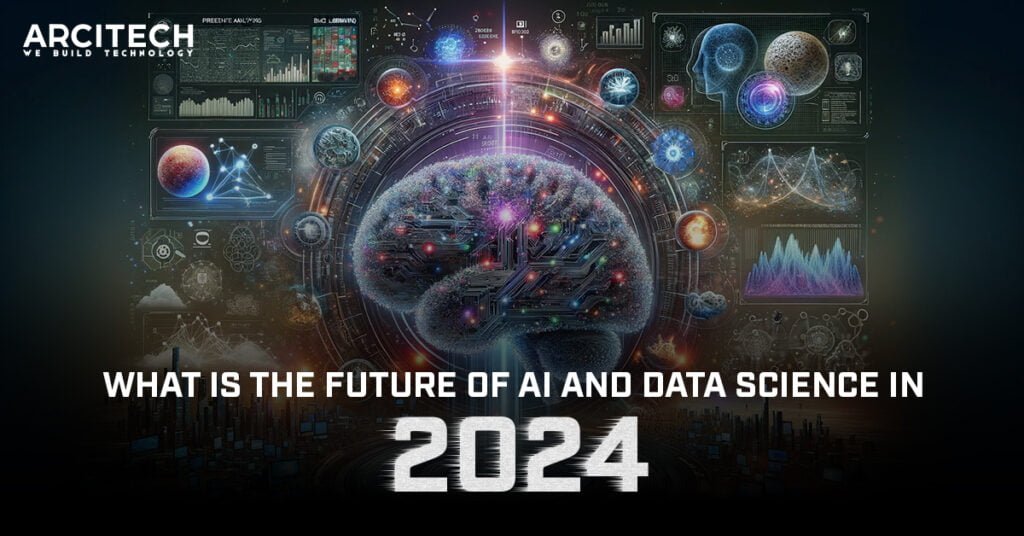The landscape of Artificial Intelligence and Data Science is rapidly evolving, and 2024 promises to be a year of significant advancements and shifts in these fields. Based on expert predictions and current trends, here are key developments to anticipate in Artificial Intelligence and Data Science for the upcoming year.
Generative AI and Large Language Models (LLMs)

- Advances in Generative AI: Generative AI, particularly through LLMs like ChatGPT, is predicted to grow in capabilities and applications. We’ll likely see these technologies become more integrated into everyday life and work, with their use extending beyond chatbots to more sophisticated and powerful applications.
- Decentralization and Democratization of LLMs: LLMs, known for their high compute and storage requirements. Are expected to become more accessible and economical. The trend will lean towards smaller, more focused models that are less power-intensive, making them available to a broader range of users.
- AI in Software Development: AI will increasingly assist developers, enhancing productivity while not replacing the need for skilled developers. Low-code/no-code tools are predicted to dominate software development, empowering “citizen developers” without extensive coding experience.
Data Science and Management
- Vector Embeddings and Modern Data Management: The use of vector embeddings will become a core enterprise data type. Enterprises are expected to prioritize these embeddings in their digital strategies. With an emphasis on vector databases optimized for AI applications.
- Synthetic Data in Data Lakes: There will be a significant increase in the use of synthetic data. Which is generated to meet data science requirements while protecting privacy and avoiding bias. This trend is driven by the scarcity of data needed to train sophisticated AI and analytics applications.
- AI-Driven Data Governance: To enhance the accuracy and trustworthiness of LLM outputs. Enterprises will adopt retrieval-augmented generation (RAG) as a core data governance practice. RAG allows automated verification against certified facts, enhancing the value and traceability of AI outputs.
Cybersecurity and AI

- Proactive AI-Driven Security Models: The focus will shift towards proactive security measures like firewalls, zero-trust frameworks, and malware detection. AI will assist in summarizing vast amounts of data, normalizing query languages, and enhancing incident response efficiency.
- AI-Assisted Cyber Attacks: We will witness more sophisticated and automated AI-assisted cyber attacks. AI will be leveraged by cybercriminals for tasks like generating phishing messages and executing malware attacks that adapt in real time.
Ethical, Legal, and Governance Aspects

- AI Regulation and Policy: There will be significant progress in AI regulation and policy, with government agencies evaluating and implementing more concrete regulations to balance the risks and benefits of AI. This may lead to a division between public and private sectors in AI policy adherence.
- Addressing AI Bias: Greater collaboration among stakeholders will be crucial to address and combat AI bias. The industry will engage in ongoing discussions to identify and reduce bias, acknowledging it as an evolving process.
- AI’s Role in Misinformation and Disinformation: The availability and ease of use of generative AI models may influence election distrust and the spread of disinformation, emphasizing the need for effective strategies to manage AI’s societal impact.
Industry-Specific AI Applications
- Applied AI in Organizational Workflows: AI will seamlessly integrate into existing organizational workflows, enhancing human capabilities and improving operational efficiency without disrupting current work patterns.
- Transformation in Business and Technology: The trend will shift from merely implementing transformation initiatives to embedding transformation into the core of business operations, with a focus on leveraging AI for strategic advantage
- AI in Customer Experience (CX): AI will transform customer service experiences, aiding agents in providing faster, clearer, and more satisfying responses, leading to new CX strategies centered around AI.
conclusion
In conclusion, 2024 is poised to be a pivotal year for Artificial Intelligence and Data Science, marked by technological advancements, the implementation of new governance and ethical frameworks, and a deeper integration of AI into various sectors. As these technologies continue to evolve, they will bring both opportunities and challenges, requiring a balanced approach to maximize their potential while mitigating risks.
FAQ
- What are the major advancements expected in AI and Data Science by 2024?
Answer: By 2024, significant advancements in AI and data science are expected to include the integration of AI in everyday applications, improvements in natural language processing, advancements in AI-driven healthcare and finance, and the development of more ethical and transparent AI models.
- How will AI and Data Science impact the job market in 2024?
Answer: Artificial Intelligence and Data Science are anticipated to create new job opportunities. Especially in fields like AI development, data analysis, and cybersecurity. While some jobs may be automated, the focus will likely shift towards roles that require AI oversight. Ethical management, and creative problem-solving.
- What role will ethics play in AI and Data Science in 2024?
Answer: Ethics will play a crucial role in Artificial Intelligence and Data Science as these fields grow. Issues like data privacy, AI bias, and ethical AI usage will be at the forefront. Necessitating stringent policies and guidelines to ensure responsible use of AI technologies.
- How will AI and Data Science evolve in terms of user accessibility by 2024?
Answer: AI and data science are expected to become more user-friendly and accessible to a wider audience by 2024. Developments in low-code/no-code platforms, user-centric AI interfaces, and educational resources will make these technologies more approachable for non-experts.
Also Read :-
The Role Of Artificial Intelligence In Education
The Amazing Rise of Claude 2.1: Giving Best AI Potential
Mastering ChatGPT API: Your Guide to AI Integration
The Top 15 AI Tools for Business in 2024 (Both Free and Paid)


